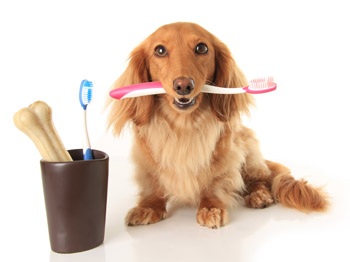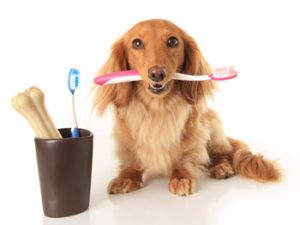Dental Hygiene

 A lot of times when we get a dog or cat, we don’t think about their teeth until it’s too late. Keeping your pets teeth clean is as important to your pet’s overall heath as nutrition, proper exercise and for some pets, routine grooming.
A lot of times when we get a dog or cat, we don’t think about their teeth until it’s too late. Keeping your pets teeth clean is as important to your pet’s overall heath as nutrition, proper exercise and for some pets, routine grooming.
Keep an eye on your pet’s teeth. Look at them regularly to avoid dental disease. To check your pet’s teeth, lift the lips all around the mouth, look at the front and back teeth as closely as possible. Be careful…as your pet may want to nip at you.
To start with, there are three kinds of dental debris…
- Food particles
- Plaque
- Tartar (calculus)
Food particles are easy to remove. Just drinking water can eliminate most of the free-floating fragments from around a dog’s teeth.
But plaque and tartar are different. Plaque is the sticky biofilm that adheres tightly to every tooth surface. It requires physical scrubbing to remove it. Once cleaned away… plaque returns again within just 24 hours.
Left along the gumline long enough, plaque slowly and inevitably turns into a rock-hard, barnacle-like crust referred to as calculus… and more commonly called tartar.
Plaque is what you remove with your toothbrush. Tartar is the hard stuff your dentist scrapes away when you get your teeth cleaned.
Once plaque builds up on the teeth, it turns into tartar or calculus. Bacteria grows in these areas and eats away at the teeth and gums. The bacterial can get into the blood stream and affect the heart and kidneys.
If you find the following, you may need to contact your Vet: Bad breath, reluctance to chew/crying out when chewing, increased salivation, red and/or puffy gums, bleeding gums, tartar/calculus (hard coating on teeth that is usually brown or yellow; results from plaque build-up), missing and/or loose teeth, anything else about the mouth that appears unusual.
There are several things you can do to help keep your pet’s teeth in good shape. The best time to start dental hygiene is when you get a puppy or kitten…but that’s not always possible.
NEVER brush your pet’s teeth with human toothpaste – it can make your dog sick! Use special enzymatic toothpaste made especially for dogs. The same goes for oral rinses.
Remember, plaque begins to turn into tartar / calculus within 24-48 hours, so daily brushing is recommended. Like us, its best to brush their teeth at night before going to bed—this will also make it easier to remember.
Use a “finger brush” or special long toothbrush designed for use on dogs. When starting out with brushings, the finger brush can help ease your dog into it, as these do not feel as awkward as hard brushes. B
If your not sure what to do, ask your Vet to show you some techniques to make tooth brushing easier on you and your dog.
What if you just can’t brush your pet’s teeth? There are other options. Raw bones, raw chicken or turkey’s necks are nature’s natural toothbrushes. Keep in mind, it you have a cat and he/she goes out and kills and eats their prey on a regular basis, it’s a good chance they will have healthy teeth.
There are products like Fresh Pet that you can add to their water to keep plaque off their teeth. Chewing dental treats like Whimzees, bones or antlers on a regular basis will prevent plaque build-up.
If you have heavy build-up we carry a product call PetzLife which helps to remove the plaque off your pets teeth avoiding the cost of getting them cleaned at the Vet. You can come in and we can give you more info or go to their website www.petzlife.com.
In severe cases, your vet will have to scale and possibly extract some teeth.
Keep in mind, that dry food does not clean your pet’s teeth. First, they would have to chew it—most don’t. For pet’s who do chew dry food, whether consistently or occasionally, there is still little or no benefit. The kibbles shatter, so contact between the kibble and the teeth occurs only at the tips of the teeth. This is certainly not enough to make a difference in the formation of tartar and plaque, which most commonly builds up along (and underneath) the gum line at the base of the teeth. Dry dog foods may actually increase plaque and tartar levels… and cause more dental problems than they supposedly prevent. It wouldn’t be logical for us to buy corn chips to clean our teeth.
There’s a lot to keeping our pet’s healthy, like us, their teeth need care on a regular basis. If you haven’t yet, today is a good day to start. If you need help, come in and see us.
Recommended Posts
FEBRUARY IS NATIONAL PET DENTAL HEALTH MONTH
February 03, 2024
National Pet Obesity Awareness Day
October 11, 2023
Vitamin D Deficiency in Cats and Dog
September 01, 2023
